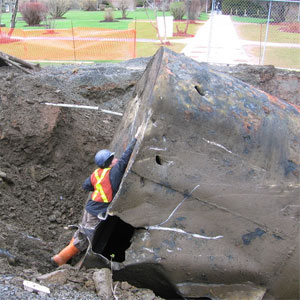 |
| The oil tank found beneath Studley quad. (Photo courtesy Facilities Management) |
╠¤╠¤╠¤Oops! Where did that come from?
Workers digging in the Studley quad to replace a water main happened upon a discoveryтАФa 64,000-litre fuel tank buried in an area between the Chemistry Building and the Killam Library.
The massive cylindrical tank measures more than nine metres in length and 3.65 metres in diameter. The tank, which still held more than 3,700 litres of oil, served an old heating plant which was torn down almost 40 years ago.
Before the tank could be removed, the oil was pumped out and the inside thoroughly cleaned. Maritime Testing was brought in to take soil samples and check for contamination.
With the tank removed, work in the quad continues on the water main replacement project and on the construction of a second fire exit for the new Student Accessibility Centre. The project is expected to continue for month or two, says Jeff Lamb, assistant vice president for Facilities Management at Dalhousie.
╠¤╠¤╠¤See you in the morning
 |
| The Computer Science Building now closes at midnight and reopens at 7 a.m. |
The Computer Science Building will no longer be open around the clock. Until recently, it was the only building to keep hours in the wee hours.
The building will now be open at 7 a.m. and close at midnight. Closing time coincides with the final Tiger Patrol run of the evening and Metro Transit availability.
тАЬThe usage was not especially heavy outside of exam time,тАЭ says Jeff Lamb, assistant vice president for Facilities Management at Dalhousie.
He says only two or three students a night took advantage of the late hours and those numbers werenтАЩt enough to justify an overnight attendant and putting the security of the equipment at risk. From a student wellness perspective, he adds, the university doesnтАЩt want to encourage all-night studying sessions.
тАЬWe had anecdotal accounts that there was all kind of demand for staying open 24-7,тАЭ says Mr. Lamb. тАЬBut the numbers just didnтАЩt back that up.тАЭ
╠¤╠¤╠¤Launching Choose Our Muse
 |
| Lilly Koltun is the director general of the Portrait Gallery of Canada. (Bruce Bottomley Photo) |
The Portrait Gallery of CanadaтАЩs director general Lilly Koltun dropped by ║┌┴╧│╘╣╧═ЇArt Gallery to launch the galleryтАЩs new commissioning program.
тАЬWe are about all Canadians, not just the great and famous,тАЭ said Dr. Koltun, director general of the Portrait Gallery of Canada at the event last Wednesday. тАЬWe are going to have a body of work that represents a living Canada.тАЭ
Called Choose Our Muse, the national program to portray living people is a biennial commissioning program. Canadians will be invited to nominate living individuals who have made a difference to their communities or to the country and whose portraits would enhance the national portrait collection.
During the summer, the gallery will receive nominees from Canadians. The final selection of three portrait subjects will be chosen by a committee of prominent Canadians and curatorial experts. Artists will be selected by the portrait subjects in consultation with the gallery.
In related news, Halifax Regional Municipality was one of nine cities invited by the federal government to submit a bid for CanadaтАЩs national portrait gallery. But the deadline passed last Friday without a proposal from HRM bidders.
╠¤╠¤╠¤Couples counselling offered
Going to university can be stressful, not only for the student but for their partner too. The long hours, pace, workload and the pressure to succeed can cause havoc on personal relationships.
║┌┴╧│╘╣╧═Їcounsellor David Mensink runs group counseling sessions, designed to help couples meet the challenges of university life together.
The group is for couples who want to improve the quality of the time they spend together. It consists of six two-hour sessions, including videotapes, discussion and exercises.
тАЬAcademic life can be 24-7, and this can be tough on a relationship,тАЭ says psychologist Dr. Mensink, with ║┌┴╧│╘╣╧═ЇCounselling Services. тАЬThe groups are important because couples can help each other. They can teach each other how to improve their relationships.тАЭ
Some of the topics discussed include: effective communication on sensitive issues; conflict resolution strategies; and couple enhancement, or what Dr. Mensink calls тАЬnow how do we have fun together?тАЭ
